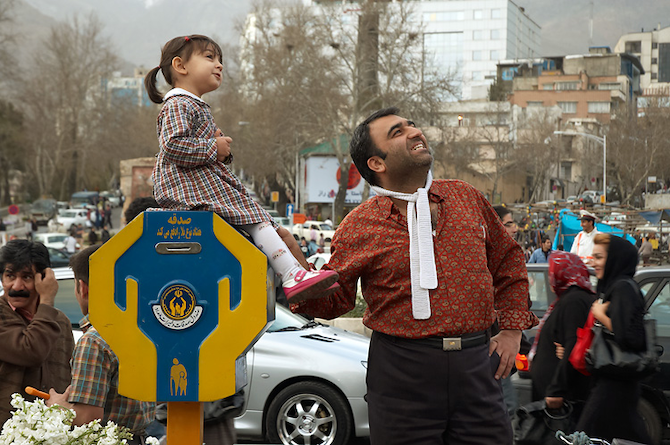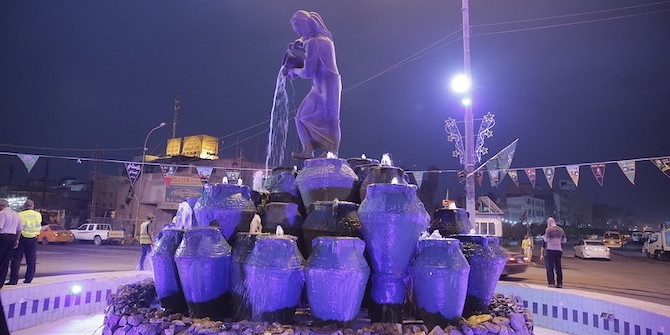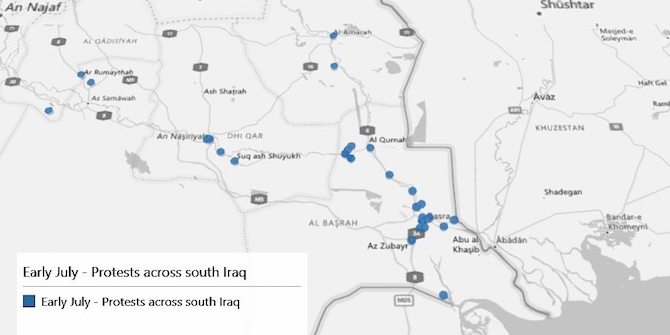by Jessica Watkins

The reinstatement of US sanctions on Iran last year within the Trump Administration’s ‘maximum pressure’ campaign has undoubtedly hit the Iranian economy hard. Amongst other markers, living costs in Iran are rising dramatically – in June, inflation rates stood at 50%; and the rial has lost almost 60% of its value against the US dollar on the unofficial market.
Judging the extent to which these economic setbacks are forcing the Islamic Republic to scale back material support to paramilitary groups across the region (which served as the pretext for Trump’s unilateral withdrawal from the Joint Comprehensive Plan of Action last May), or indeed investment into cultural diplomacy and charitable activities in neighbouring countries, is of course challenging. Tehran does not make a habit of broadcasting its expenditures abroad, but the government has made it abundantly clear that it intends to ride the storm of US sanctions (again). In this respect, there is little prospect of it abandoning its allies or its cultural initiatives in Palestine, Yemen, Syria or Iraq (let alone Lebanon). Even so, domestic criticism of Iran’s foreign funding is pushing the regime to take a more defensive public stance on justifying its foreign policies.
At a time when perhaps a third of the population lives below the poverty line, Iran’s financial backing to causes other than its own people’s welfare is controversial; and even a theocracy is vulnerable to domestic censure, particularly when it levies appreciable taxes. Indeed, Rouhani’s rare attempt at budgetary transparency in December 2017 sparked mass public protests, partly because of what it revealed about the vast sums directed towards religious institutions involved in promulgating the regime’s ideological legitimacy. While the budget said little about funding abroad, over the last few years there have been concerted efforts amongst Iranian and Iranian-affiliated charitable institutions in the region to demonstrate that they are not draining Iran’s resources.
In some cases this has involved demonstrating that Iran’s economy is also benefiting from external investment (for instance, by claiming that the majority of Iranian donations to the restoration of Iraqi shrines feeds back into the Iranian economy through employment, logistics operations and the purchasing of Iranian raw materials). In others, it has involved denying that Iran is in fact funding charitable initiatives abroad, and asserting that its main contributions consist of technical expertise.
One notable institution in this respect is the Imam Khomeini Relief Agency (IKRA), Iran’s best known and longest running internationally active charitable foundation which is directly connected to Khamenei’s office, and which in the past has run high-profile relief operations, primarily directed towards Shi’a populations in ‘fragile’ zones. In 2010, the US designated IKRA’s Lebanon branch a foreign terrorist organisation based on its connections to Hezbollah. Last year IKRA removed the page on ‘external activities’ from its website, amidst public censure regarding its Ramadan aid missions to Gaza. IKRA in Iraq, which has been active since 2006, and has official memorandums of understanding with the Iraqi Ministry of Sport and Youth and Ministry of Labour, has offices in Najaf, Karbala, Kadhemiya and Basra. It has repeatedly noted in Farsi language public statements that it is independent from its Iranian mother organisation, and that all of the funds it raises for Iraqi causes emanates from Iraq, not Iran.
IKRA Iraq has an active Arabic-language Facebook page showing its charitable activities including the regular distribution of food rations to Iraqi families in need, and implementation of vocational training courses. In 2015 after Grand Ayatollah Sistani’s ‘blessing’ of the Popular Mobilisation Units (the Hashd) IKRA Iraq set up collection boxes in Iraqi cities for the ‘Holy Hashd’.
And, in April 2019, the tables turned as the agency issued a public call to Iraqis to donate zakat and sadaqa funds to assist Iranians affected by flooding in the Western provinces. The call read: ‘After they stood with us to fight Daesh, it is our turn to reciprocate and to stand with the Muslim Iranian people to confront the floods that have destroyed life in Iran’. Both Iranian and Iraqi press indicated that the Popular Mobilisation Units (PMU), including their leaders Abu Mahdi al-Muhandis and Harakat al-Najba delivered humanitarian aid to flood victims via the Mehran border crossing on the invitation of Iranian Qods Force leader, Qassem Soleimani. One article noted that other Iranian charitable organisations had been banned by the authorities from delivering aid.
Iran’s public emphasis on Iranian-affiliated organisations in Iraq acting as partners as opposed to helpless dependents can be seen partly as the product of a public relations exercise to alleviate domestic criticism. But it has also become associated with the Iranian model of external intervention, exemplified in Lebanon. Since its establishment during the Lebanese civil war, Hezbollah has developed progressively more autonomy from Iran, and while it undoubtedly still relies on Iranian weaponry, most of its funding appears to come from donations from its core Lebanese Shi’a constituency, and from successful integration into and exploitation of the Lebanese political economy. In Iraq, following the campaign against Daesh, Iranian-affiliated Shi’a PMUs such as Kata’ib Hezbollah, Asa’ib Ahl al-Haq, Harakat al-Najba and the Imam Ali Brigades as well as Badr, have become embedded into local political marketplaces, using their roles as security actors to extract trade tariffs, negotiate business agreements, and in some cases gain access to oil industry profits.
In the charitable sector too, the Lebanese experience is instructive. Hezbollah’s network of Beirut-based NGOs established in the 1980s were initially funded by Iran, but increasingly relied on Lebanese Shi’a donations to provide welfare to injured fighters, their families, widows and orphans, but also vocational training which could make beneficiaries self-sufficient and even contributors to other charitable causes. It was arguably the combination of militant resistance with social welfare provisioning that secured a steadfast support group within Lebanese society.In Iraq, even if some Iranian-affiliated charities are in fact still dependent on Iran, the goal is clearly that they should become self-supporting, bearing Iran’s wilayat al-faqih (governance of jurisprudent) ideology, without placing undue burdens on Iran’s economy.
Of course, the Iraqi predicament differs substantially from that in Lebanon, quite apart from the fact that the PMU are now officially part of the state security apparatus, whereas Hezbollah never has been. On the one hand, Shi’ism in Iraqi society, where perhaps 70 percent of the 40 million strong population is at least nominally Shi’a, occupies a rather different place to that in Lebanon, where only a minority of the six million people are Shi’a. In Lebanon, Hezbollah is by far the most popular militant-political organisation amongst the Shi’a: Iran has consistently associated itself with Hezbollah and vice versa. By comparision, in Iraq, there are many competing Shi’a parties, and many competing Shi’a militias, and Iran has fluctuated between playing paternalistic, mediatory and provocative roles amongst these factions. Moreover, Khamenei’s brand of wilayat al-faqih faces a tough crowd amongst Iraqi Shi’a, where Ali Sistani’s much touted political quietism (breached only in dire circumstances) is the norm. In the aftermath of the military campaign against Daesh, Iraqis are increasingly critical of Iran’s role in Iraq.
On the other hand, when it comes to welfare, even though the Iraqi federal government is in disarray, Iraqis in need still look to the state welfare system to provide a safety net, whereas in Lebanon, overall, charities, NGOs, private insurance and self-help mechanisms play a more prominent role. As a result, barring the eventuality of a complete break-down in this safety net, the practical role played by IKRA and other charitable organisations linked to Iran in Iraq is only ever likely to be peripheral.
But all the same, the Trump Administration should be careful what it wishes for. It wants Iran to cut material support to militant groups across the region. But that is presumably also what Iran wants: to foster institutions abroad which are capable of becoming enmeshed into the fabric of their own economies and societies to the extent that they no longer need Iranian funding.
This piece was originally published on the Conflict Research Programme (CRP) blog. This blog gives the views of the author, not the position of the Conflict Research Programme, the London School of Economics and Political Science, or the UK Government.







5 Comments